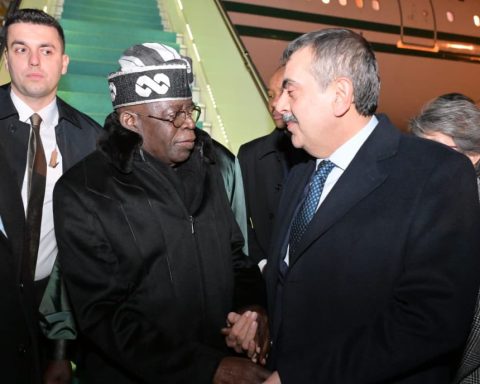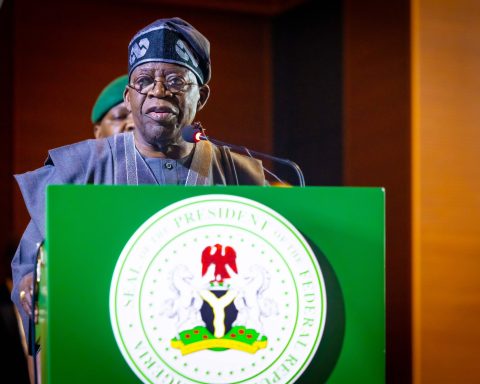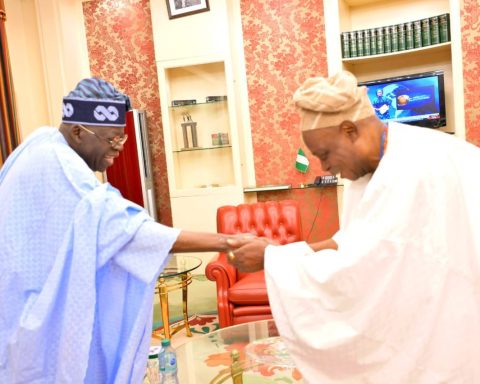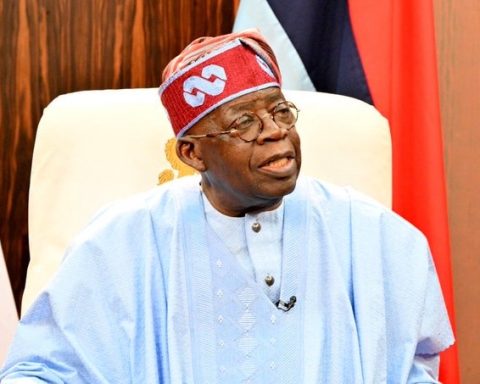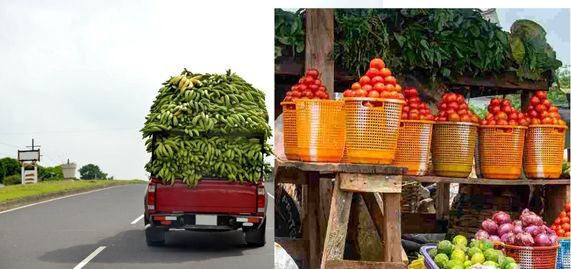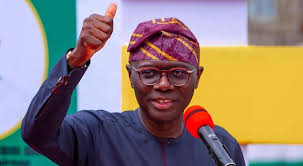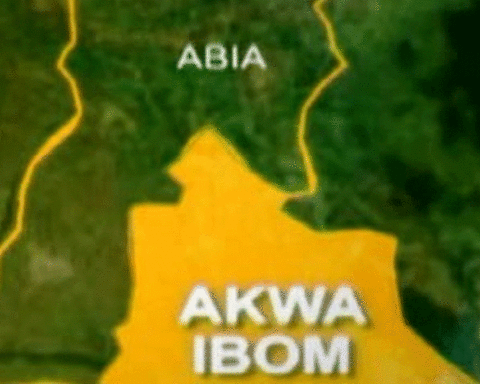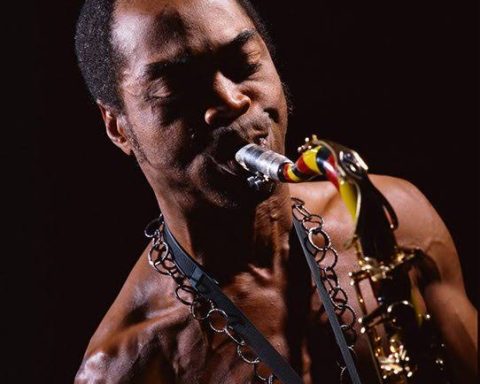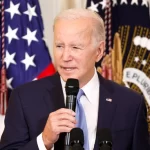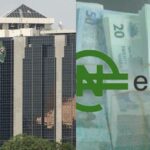True leadership is measured not just by the praise of elites or international observers but fundamentally by how the leader’s policies and actions improve the lives of the people they serve.
A responsible leader must actively listen to the experiences, concerns, and aspirations of ordinary citizens, their followers, before concluding that their tenure is successful. Without this grassroots feedback, there is a risk of creating a disconnect between government narratives and the realities on the ground.
Join our WhatsApp ChannelPresident Bola Tinubu’s two years in office have elicited widespread praise from key Nigerian leaders who commend his bold economic reforms and developmental strides.
Senate President, Godswill Akpabio, has lauded Tinubu’s leadership as transformative, emphasising how his policies have restored hope and set Nigeria on a path of economic stability and growth.
Also, the speaker of the House of Representatives, Tajudeen Abbas, praised Tinubu’s dedication to national development and policy reforms, noting the positive impact on governance and inclusiveness.
APC National Chairman Abdullahi Ganduje praised the president for breaking presidential inertia with steady and capable leadership, crediting him with rejuvenating the economy through skilful fiscal and monetary policies.
Going further, the Progressive Governors’ Forum Chairman, Hope Uzodinma, alongside other APC governors like Ekiti State Governor Biodun Oyebanji, acknowledged significant infrastructural developments and courageous leadership under Tinubu’s administration.
Even the Federal Capital Territory Minister, Nyesom Wike, described the rapid transformation and infrastructural progress in Abuja as unprecedented under the Renewed Hope Agenda. These endorsements reflect a broad consensus within the ruling party and allied officials that Tinubu’s first two years have been marked by substantial achievements in economic reform, infrastructure, and governance.
Tinubu also gets lauded internationally
Internationally, Tinubu’s administration has also received commendations. The World Bank recognised Nigeria’s economy in 2024 as achieving its fastest growth in a decade, projecting a 3.6% growth rate for 2025, attributing this to the government’s fiscal and monetary reforms. The projection marks Nigeria’s best performance since 2014, largely due to Tinubu’s subsidy removal and monetary policy reforms that helped stabilise the naira and increase tax revenues. This is the World Bank’s view.
READ ALSO: World Bank’s Call For NNPCL Audit Raises Questions On Nigeria’s Sovereignty
Reuters and other global media outlets have noted the dramatic improvements in Nigeria’s external reserves, from $4 billion in 2023 to over $23 billion by the end of 2024, and the stabilisation of the economy despite global shocks.
Economic analysts abroad have highlighted the administration’s success in narrowing the fiscal deficit from 5.4% of GDP in 2023 to 3.0% in 2024, and the surge in oil rig activity and investments in the oil and gas sector.
Recently also, the Financial Times, which focuses on global economic and financial issues, published an editorial assessing President Bola Tinubu’s two years in office. The FT acknowledged that despite Nigeria facing unprecedented hardship, Tinubu’s administration has made notable progress through bold but sometimes haphazard economic and monetary reforms.
The editorial described Tinubu’s government as “stuffed with cronies” yet still managing to stabilise the economy and lay the groundwork for recovery, with Nigeria now in better shape than at any time in the last decade.
The Financial Times editorial highlighted the severe cost-of-living crisis affecting tens of millions of Nigerians and urged the president to continue reforms with a focus on making ordinary citizens feel the benefits. The editorial warned against slowing down reforms as the 2027 elections approach and called for urgent action on inflation, food security, and insecurity to ensure broader recovery. Overall, the Financial Times praised Tinubu’s progress while emphasising the need for more inclusive economic gains.
Evidence that together, domestic and international commendations paint a picture of a presidency that, despite initial hardships and ongoing challenges, has laid a foundation for sustained economic recovery and development, positioning Nigeria for a more prosperous future. Nonetheless, the endorsements from these prominent figures do demonstrate that many of Nigeria’s political and economic elites are indeed happy with the direction Tinubu has taken the country so far.
While many political leaders and foreign institutions laud his economic reforms and governance, it is equally important to consider the perspectives of everyday Nigerians who grapple with inflation, unemployment, and insecurity.
The global economy and neocolonialism
The global economy in 2025 is facing a notable slowdown, with growth forecasts dropping to around 2.3% to 2.9%, the slowest pace since the COVID-19 pandemic. This deceleration is driven by lingering trade tensions, higher tariffs, financial market volatility, and structural uncertainties. Inflation is easing in many regions but remains a concern, especially in the services sector amid tight labour markets. Central banks in major economies like the U.S. and Europe are cautiously adjusting monetary policies, with some easing expected in Europe while the U.S. holds rates steady. China’s growth is also slowing due to internal challenges and external trade pressures.
Is it not obvious that the good health of the global economy never reflects good health for the vast majority of the world? The current United Nations Secretary-General is António Guterres, who has been in office since January 2017.
He has repeatedly emphasised the urgent need to address global inequalities and protect vulnerable populations, especially in health crises like HIV/AIDS.
An example of the challenges faced by many countries due to policy decisions by powerful nations is the Trump administration’s abrupt and sweeping cuts to U.S. foreign aid starting in 2025. These cuts severely impacted critical programmes worldwide that provide essential healthcare, food security, and humanitarian support to marginalised groups, including women, children, refugees, and survivors of violence.
This is notwithstanding that most raw materials, including gold and oil, come from Africa, yet the West can easily make decisions that only benefit it, while the developing countries cannot. This is a piece of clear evidence that the powerful nations are only interested in the economic values that they benefit from Africa and not about Africa, or its citizens’ welfare.
Reports from the United Nations and the IMF highlight that despite steady global growth, many low-income and developing countries continue to struggle with slow income growth, high inflation (especially food inflation), rising debt burdens, and persistent unemployment. For these populations, economic gains remain elusive, and poverty reduction has slowed or even reversed in some regions.
READ ALSO: Focus On Most Vulnerable While Stabilising Economy – IMF Tells Nigerian Govt
For instance, the group of Francophone African countries under the so-called Françafrique system, including Gabon, Ivory Coast, Togo, Republic of the Congo, Chad, and Niger that nations maintain close political and economic ties with France, which continues to exert significant influence through military presence, control of resources, and support for local elites aligned with French interests.
The Democratic Republic of Congo (formerly Belgian Congo) also illustrates neocolonialism, where Belgium’s post-independence economic dominance through multinational corporations and control of mineral-rich regions has persisted. Despite international recognition of reforms and foreign investment inflows, the country struggles with sovereignty and equitable development.
So countries like Nigeria, the Francophone Françafrique states, and the DRC demonstrate how neocolonialism continues to shape African economies and politics. Global financial bodies often praise reforms that align with neoliberal prescriptions, yet these reforms can deepen dependency and fail to translate into broad-based development, highlighting the complex and enduring legacy of neocolonialism in Africa.
Fuel Subsidy removal and the actual reality
The removal of fuel subsidies and the floating of the naira under President Tinubu’s administration have significantly increased the prices of petroleum products and weakened the naira against foreign currencies. This currency depreciation has made foreign currencies like the US dollar and British pound much stronger relative to the naira, creating a severe deficit in Nigeria’s terms of trade and balance of payments. For example, what $10 can buy in Nigeria is far less than what $100 can buy in the US, and similarly with the pound sterling, reflecting the sharp erosion of purchasing power for Nigerians.
The subsidy removal, intended to save government costs and reduce borrowing, led to fuel prices soaring from around ₦190 per litre to over ₦900 in some areas, triggering inflation that had exceeded 33% in 2024. This inflation has cascaded into higher transport fares, food prices, and general living costs, disproportionately impacting low- and middle-income Nigerians.
The floating of the naira, while aimed at unifying exchange rates and attracting investment, caused the currency to weaken excessively, making imports more expensive and worsening the trade deficit. Despite increased government revenues from subsidy savings, infrastructure and social services remain underfunded, and many Nigerians feel the pinch of reduced purchasing power and economic hardship.
In essence, while the reforms have been praised by global financial bodies for fiscal prudence and macroeconomic stabilisation, the immediate economic reality for most Nigerians is a sharp decline in living standards and a widening gap between the value of their currency and foreign currencies, deepening economic inequalities and hardship
It is now fair to add that those praising Tinubu about a stable economy are only foreign beneficiaries of his economic misagenda in Nigeria, & maybe, they have a hand in drawing up that economic blueprint for Tinubu.
Institutions like the IMF and World Bank commend reforms such as subsidy removal and exchange rate liberalisation as bold steps toward macroeconomic stability. However, these policies reflect standard neoliberal prescriptions often detached from Nigeria’s socio-economic realities.
This dynamic reveals that much of the praise comes from those who shaped or benefit from the reforms, raising questions about whose interests are truly served. The gap between elite endorsements and public hardship highlights the urgent need for policies centred on Nigerians’ lived experiences rather than external economic orthodoxy
For the current administration:
It still has two years to have a rethink. Leadership effectiveness is best judged by tangible improvements in citizens’ well-being, access to opportunities, and security. Engaging with the populace, understanding their struggles, and adapting policies accordingly are essential for a leader to truly claim success. Ultimately, a leader’s legitimacy and legacy rest on the positive impact felt by the majority, not just the applause of a few.
Dr Mbamalu, a Jefferson Journalism Fellow, member of the Nigerian Guild of Editors and Media Consultant, is the publisher of Prime Business Africa
Dr. Marcel Mbamalu is a distinguished communication scholar, journalist, and entrepreneur with three decades of experience in the media industry. He holds a Ph.D. in Mass Communication from the University of Nigeria, Nsukka, and serves as the publisher of Prime Business Africa, a renowned multimedia news platform catering to Nigeria and Africa's socio-economic needs.
Dr. Mbamalu's journalism career spans over two decades, during which he honed his skills at The Guardian Newspaper, rising to the position of senior editor. Notably, between 2018 and 2023, he collaborated with the World Health Organization (WHO) in Northeast Nigeria, training senior journalists on conflict reporting and health journalism.
Dr. Mbamalu's expertise has earned him international recognition. He was the sole African representative at the 2023 Jefferson Fellowship program, participating in a study tour of the United States and Asia (Japan and Hong Kong) on inclusion, income gaps, and migration issues.
In 2020, he was part of a global media team that covered the United States presidential election.
Dr. Mbamalu has attended prestigious media trainings, including the Bloomberg Financial Journalism Training and the Reuters/AfDB Training on "Effective Coverage of Infrastructural Development in Africa."
As a columnist for The Punch Newspaper, with insightful articles published in other prominent Nigerian dailies, including ThisDay, Leadership, The Sun, and The Guardian, Dr. Mbamalu regularly provides in-depth analysis on socio-political and economic issues.



